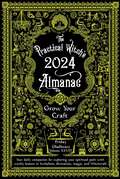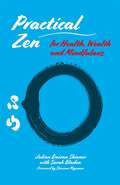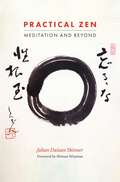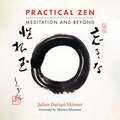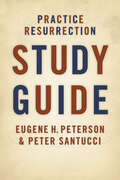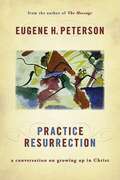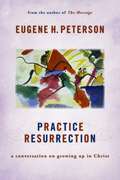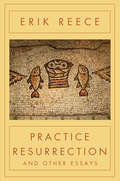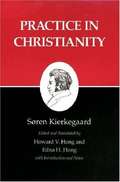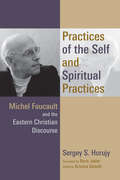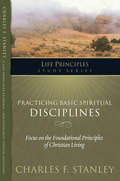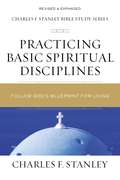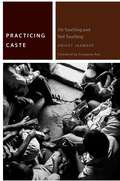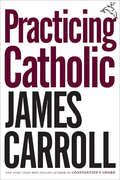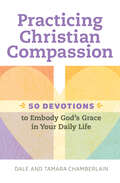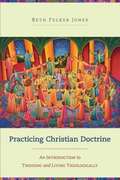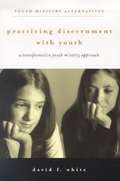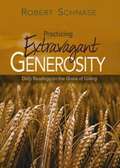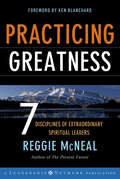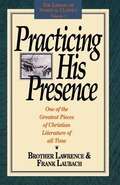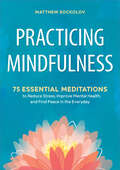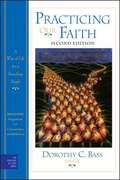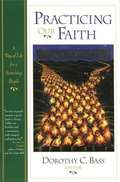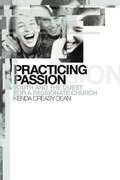- Table View
- List View
Practical Witch's Almanac 2024: Growing Your Craft
by Friday GladheartA daily companion for exploring your spiritual path with weekly lessons in herbalism, divination, magic, and Witchcraft.Enrich your spiritual and magical journey with The Practical Witch's Almanac. This almanac provides more than Moon phases, Sabbats, and astronomical and astrological information. Every week you'll explore lessons in herbalism, magic, divination, and more.This practical guide gives you recipes, DIY projects, tips, and advice to keep you motivated and engaged as you grow your craft. You'll explore tarot cards, runes, tea leaves, and other forms of divination. The herbal studies mentor you through basic teas, tinctures, foods, ointments, incense, and lotions while emphasizing the synergistic union of science and magic. The magic lessons help you hone your spell casting, and the spiritual studies assist you in exploring your beliefs.Weekly bonus material is available at http://PracticalWitch.com/My2024. The Practical Witch Talk podcast expands on each week's lessons.
Practical Zen for Health, Wealth and Mindfulness
by Julian Daizan Skinner Shinzan Miyamae Sarah BladenBringing the body-mind insights of Rinzai Zen from the mountains of Japan to the Western world, Zen master Julian Daizan Skinner and Sarah Bladen present simple meditation techniques to help achieve health, wellbeing and success. Taking the reader through the first 100 days of practice, the book then shows how to adapt the new learned techniques to the rest of your life. Including case studies at the end of each chapter to show how people's lives have been transformed through their meditation journeys, this is an accessible and practical guide to adapting Eastern meditation into busy Western lives.
Practical Zen: Meditation and Beyond
by Julian Daizan Skinner Shinzan MiyamaeZen master Julian Daizan Skinner guides the reader through a sequence of meditation techniques that can safely lead even a complete novice through to advanced levels. Based on his own long experience of the Rinzai Zen tradition, as taught by the great seventeenth-century masters, Hakuin and Bankei, Daizan highlights the key points for success and addresses the pitfalls. Structured around a traditional teaching framework called "The two wings of a bird," Daizan clearly lays-out how these methods build and combine to create a transformative and sustaining practice. The book contains an extremely useful section describing the experiences of western practitioners who have successfully applied this framework within the pressures of modern life. The final section features key source texts in translation, making the book a complete introduction and guide to Zen meditation. The work of a master, the book speaks at a deep level, with utmost simplicity.
Practical Zen: Meditation and Beyond
by Julian Daizan SkinnerA simple yet profound guide to establishing a transformative and sustaining Zen meditation practice.Zen master Julian Daizan Skinner guides the listener through a sequence of meditation techniques that can safely lead even a complete novice through to advanced levels. Based on his own long experience of the Rinzai Zen tradition, as taught by the great seventeenth-century masters, Hakuin and Bankei, Daizan highlights the key points for success and addresses the pitfalls. Structured around a traditional teaching framework called "The two wings of a bird," Daizan clearly lays-out how these methods build and combine to create a transformative and sustaining practice. The work of a master, the audiobook speaks at a deep level, with utmost simplicity.(P) 2021 Jessica Kingsley Publishers
Practice Resurrection Study Guide
by Eugene H. Peterson Peter SantucciThough bringing people to new birth in Christ through evangelism is essential, says Peterson, isn't it obvious that growth in Christ is equally essential? Yet the American church does not treat Christian growth and character formation with equivalent urgency. We are generally uneasy with the quiet, obscure conditions in which growth takes place, and building maturity in Christ too often gets relegated to footnote status in the text of our lives. In Practice Resurrection Peterson brings the voice of Scripture -- especially Paul's letter to the Ephesians -- and the voice of the contemporary Christian congregation together to unpack what it means to fully grow up "to the stature of Christ." Peterson's robust discussion will move readers to restore transformed Christian character to the center of their lives. This helpful study guide is designed to enable small groups in schools or churches -- or even individuals -- to delve deeper into the timely wisdom of Practice Resurrection: A Conversation on Growing Up in Christ. Peter Santucci here breaks up Peterson's book into thirteen "sessions," each of which contains a summary, select quotes to consider, questions for interaction, and a prayer drawn from the text of Ephesians that is covered in the corresponding book chapter.
Practice Resurrection: A Conversation on Growing Up in Christ
by Eugene H. PetersonThis is a conversation on becoming a mature Christian, Christian formation, growing up to the stature of Christ. All of us are born. No exceptions. Birth brought us alive, kicking and crying, into a world that is vast, complex, damaged, demanding... and beautiful. In increments, day-by-day, we begin to get the hang of it. We drink from our mother's breast, go to sleep, and wake up. One day on waking up we stand upright and amaze everyone with our pedestrian acrobatics. It isn't long before we're old hands at language, using nouns and verbs with the best of them. We are growing up.
Practice Resurrection: A Conversation on Growing Up in Christ
by Eugene H. PetersonWinner of Christianity Today's 2011 award for best book in spiritualityThough bringing people to new birth in Christ through evangelism is essential, says Eugene Peterson, isn't growth in Christ equally essential? Yet the American church by and large does not treat Christian maturity and character formation with much urgency.In Practice Resurrection Peterson brings the voice of Scripture -- especially Paul's letter to the Ephesians -- and the voice of the contemporary Christian congregation together to unpack the crucial truth of what it means to fully grow up to the "stature of Christ."
Practice Resurrection: And Other Essays
by Erik Reece"Erik Reece is obviously a writer to be reckoned with."—Bill McKibben, author of The End of NatureIn Erik Reece's stunning collection of essays, ideas are the main characters. Written over a period of ten years, and revealing Reece's continued obsession with religion, family, and the natural world, in many ways these essays represent a sequel to his stirring memoir, An American Gospel. In that book, Reece intimitately describes his conflicted relationship with Christianity in the context of the death of his father, and Reece's own journey since then to find meaning and balance in the material and spiritual worlds. Practice Resurrection continues that exploration through essays that take the reader to Norway, New England, London, the Adirondacks, Appalachia, and back to Reece's native Kentucky River. "With his singular wit and pith, environmental writer Reece explores issues such as God, Christianity, the environment (of course), and his father's suicide in essays rife with sentient turns of phrase and exceptionally insightful passages . . . Few are better than [Reece] is at discussing a personal crisis of faith." —Booklist (starred review)
Practice in Christianity
by Howard V. Hong Edna H. Hong Søren KierkegaardOf the many works he wrote during 1848, his "richest and most fruitful year," Kierkegaard specified Practice in Christianity as "the most perfect and truest thing. " In his reflections on such topics as Christ's invitation to the burdened, the imitatio Christi, the possibility of offense, and the exalted Christ, he takes as his theme the requirement of Christian ideality in the context of divine grace. Addressing clergy and laity alike, Kierkegaard asserts the need for institutional and personal admission of the accommodation of Christianity to the culture and to the individual misuse of grace. As a corrective defense, the book is an attempt to find, ideally, a basis for the established order, which would involve the order's ability to acknowledge the Christian requirement, confess its own distance from it, and resort to grace for support in its continued existence. At the same time the book can be read as the beginning of Kierkegaard's attack on Christendom. Because of the high ideality of the contents and in order to prevent the misunderstanding that he himself represented that ideality, Kierkegaard writes under a new pseudonym, Anti-Climacus.
Practices of the Self and Spiritual Practices: Michel Foucault and the Eastern Christian Discourse
by Kristina Stoeckl Sergey S. HorujyIn this book Sergey Horujy undertakes a novel comparative analysis of Foucault’s theory of practices of the self and the Eastern Orthodox ascetical tradition of Hesychasm, revealing great affinity between these two radical “subject-less” approaches to anthropology. As he facilitates the dialogue between the two, he offers both an original treatment of ascetical and mystical practices and an up-to-date interpretation of Foucault that goes against the grain of mainstream scholarship.In the second half of the book Horujy transitions from the dialogue with Foucault to his own work of Christian philosophy, rooted in -- but not limited to -- the Eastern Christian philosophical and theological tradition. Horujy’s thinking exemplifies the postsecular nature of our contemporary period and serves as a powerful invitation to think beyond religious-secular divides in philosophy and Eastern-Western divides in intellectual history.
Practicing Basic Spiritual Disciplines (Life Principles Study Series)
by Charles StanleyLooking for a church with modern spiritual disciplines? Stop.God has something to say about Bible study, prayer witnessing, church attendance, service, and obedience, but many churches are unknowingly losing what God wants in an effort to become more relevant and increase attendance. Dr. Charles Stanley helps you take another look at what the Bible says concerning the age-old tools presented in the Scriptures and lets you decide if your church is still doing it right.
Practicing Basic Spiritual Disciplines: Follow God's Blueprint for Living (Charles F. Stanley Bible Study Series)
by Charles F. StanleyWhat spiritual disciples do you follow to help you grow closer to God? In Practicing Basic Spiritual Disciplines, you will examine several such practices that will help you mature in Christ and develop a consistent and unwavering walk of faith. Ultimately, these practices will lead to you becoming more like the Savior! You will learn how to develop these disciplines that build "spiritual muscle," learn the ten hallmarks of spiritual strength, and discover Rs of spiritual growth. Most important, you will learn about the character of God.The Charles Stanley Bible Studies are a unique approach to Bible study, incorporating biblical truth, personal insights, emotional responses, and a call to action. Each study draws on Dr. Stanley's many years of teaching on the guiding principles found in God's Word, showing how we can apply them in practical ways to every situation we face. This edition of the series has been completely revised and updated and includes two brand-new lessons from Dr. Stanley.
Practicing Caste: On Touching and Not Touching (Commonalities)
by Aniket JaawarePracticing Caste attempts a fundamental break from the tradition of caste studies, showing the limits of the historical, sociological, political, and moral categories through which it has usually been discussed. Engaging with the resources phenomenology, structuralism, and poststructuralism offer to our thinking of the body, Jaaware helps to illuminate the ethical relations that caste entails, especially around its injunctions concerning touching. The resulting insights offer new ways of thinking about sociality that are pertinent not only to India but also to thinking the common on a planetary basis.
Practicing Catholic
by James CarrollA personal examination of the Catholic faith, its leaders, and its complicated history by a National Book Award–winning, New York Times-bestselling author.James Carroll turns to the notion of practice—both as a way to learn and a means of improvement—as a lens for this thoughtful and frank look at what it means to be Catholic. He acknowledges the slow and steady transformation of the Church from its darker medieval roots to a more pluralist and inclusive institution, charting along the way stories of powerful Catholic leaders (Pope John XXIII, Thomas Merton, John F. Kennedy) and historical milestones like Vatican II.These individuals and events represent progress for Carroll, a former priest, and as he considers the new meaning of belief in a world that is increasingly as secular as it is fundamentalist, he shows why the world needs a Church that is committed to faith and renewal.“Carroll, a former Catholic priest who wrote of his conflict with his father over the Vietnam War in An American Requiem, revisits and expands on that tension in this spiritual memoir infused with church history . . . Readers who, like Carroll, remain Catholic but wrestle with their church’s positions on moral issues will most appreciate his story.” —Publishers Weekly“Thought-provoking.” —San Francisco Chronicle“[An] engrossing faith memoir . . . a page-turner.” —Kirkus Reviews
Practicing Christian Compassion: 50 Devotions to Embody God's Grace in Your Daily Life
by Dale Chamberlain Tamara ChamberlainExpand, nurture, and share your compassion—50 Christian devotions to deepen your faith Deepen your faith and fill your heart with loving kindness. Practicing Christian Compassion is a collection of devotions that help you reflect on the concept of compassion in all aspects of your life so you can embody grace and kindness toward others. Each entry focuses on a key Bible verse centered around compassion so you can learn how to practice empathy toward everyone—from your own family to the global community. Discover how Jesus's wisdom encourages you to be considerate of the people around you through thought-provoking scripture, short prayers, and prompts that help you act on and embody what you've learned. Practicing Christian Compassion features: The five pillars of compassion—Learn how to be compassionate toward family, friends, colleagues, the local community, and the global community in good and bad times. Insightful scripture—Explore what being compassionate truly means for your faith as you learn to open your heart and love the way Jesus does. Helpful tips—Find ways to put your learnings into practice with helpful exercises and suggested action items that show you're truly committed to compassionate living. Become a more compassionate and faithful person with help from Practicing Christian Compassion.
Practicing Christian Doctrine: An Introduction to Thinking and Living Theologically
by Beth Felker JonesThis introductory theology text explains key concepts in Christian doctrine and shows that doctrine is integrally linked to the practical realities of Christian life. In order to grow into more faithful practitioners of Christianity, we need to engage in the practice of learning doctrine and understanding how it shapes faithful lives. Beth Felker Jones helps students articulate basic Christian doctrines, think theologically so they can act Christianly in a diverse world, and connect Christian thought to their everyday life of faith. This book, written from a solidly evangelical yet ecumenically aware perspective, models a way of doing theology that is generous and charitable. It attends to history and contemporary debates and features voices from the global church. Sidebars made up of illustrative quotations, key Scripture passages, classic hymn texts, and devotional poetry punctuate the chapters.
Practicing Discernment With Youth: A Transformative Youth Ministry Approach
by David F. White"Over the last half-century," says David White, "congregational youth ministry has undergone a separation from its own sense of place. The expectations, imaginations, and practices of youth ministry are more likely to originate in Southern California. Colorado, or denominational headquarters than they are within the unique and particular setting of a congregation. " In Practicing Discernment with Youth, White calls for congregations to engage their young people in practices of discernment that involve the gifts and problems of their unique context, bringing their lives more fully into partnership with God's work in their given place. He develops the notion of practicing discernment among youth as a means of returning the responsibility for youth ministry to local congregations and youth groups and provides a new understanding of youth ministry as a way of responding to the particular wounds, blessings, gifts, and charisms of youth and congregations. White uses historical discernment practices of Christian communities such as Ignatian contemplative practices, Quaker clearness counsels, consensus decision making, and silence; biblical reflection that emerged from Protestant reformation; and social analysis of Latin American base communities.
Practicing Extravagant Generosity: Daily Readings on the Grace of Giving (Five Practices Of Fruitful Congregations Ser.)
by Robert SchnaseHelp implant the heart of giving within a congregation.The daily readings by Bishop Schnase, opens the Scriptures to show the joy and grace of giving. Designed to provide daily Bible readings for four weeks, it leads the reader to explore such questions as “Why do we give,” “Who benefits most from our giving,” and “Where does true contentment come from?” By reading and following this guide to the spiritual discipline of stewardship, church members will experience the joy of serving God with their time, talents, and gifts afresh.
Practicing Greatness: 7 Disciplines of Extraordinary Spiritual Leaders (Jossey-Bass Leadership Network Series #18)
by Reggie McNealFrom an author and ministry consultant, seven practices for taking your religious leadership from good to great. Often spiritual leaders do not aspire to greatness for fear of seeming to lack humility. Yet greatness in spiritual leadership is just what we need—in our churches, our businesses, in education, in the social sector, in every sector of society. The question is how do good spiritual leaders become great leaders? Based on his extensive experience as coach and mentor to many thousands of Christian leaders across a broad spectrum of ministry settings, Reggie McNeal helps spiritual leaders understand that they will self-select into or out of greatness. McNeal shows how great spiritual leaders are committed intentionally to seven spiritual disciplines, habits of heart and mind that shape both their character and competence: *The discipline of self-awareness—the single most important information a leader possesses *The discipline of self-management—handling difficult emotions, expectations, temptations, as well as mental and physical well-being *The discipline of self-development—a life-long commitment to learning and growing and building on one's strengths *The discipline of mission—maintaining the sense of God's purpose in your life *The discipline of decision-making—knowing the elements of good decisions and learning from failure *The discipline of belonging—nurturing relationships and living in community with others *The discipline of aloneness—the intentional practice of solitude and contemplation &“Practicing Greatness is a hard-hitting leadership book.&” —from the Foreword by Ken Blanchard, author of The One-Minute Manager and Lead Like Jesus: Lessons from the Greatest Leadership Role Model of All Time
Practicing Greatness: 7 Disciplines of Extraordinary Spiritual Leaders (Jossey-Bass Leadership Network Series #18)
by Reggie McNealFrom an author and ministry consultant, seven practices for taking your religious leadership from good to great. Often spiritual leaders do not aspire to greatness for fear of seeming to lack humility. Yet greatness in spiritual leadership is just what we need—in our churches, our businesses, in education, in the social sector, in every sector of society. The question is how do good spiritual leaders become great leaders? Based on his extensive experience as coach and mentor to many thousands of Christian leaders across a broad spectrum of ministry settings, Reggie McNeal helps spiritual leaders understand that they will self-select into or out of greatness. McNeal shows how great spiritual leaders are committed intentionally to seven spiritual disciplines, habits of heart and mind that shape both their character and competence: *The discipline of self-awareness—the single most important information a leader possesses *The discipline of self-management—handling difficult emotions, expectations, temptations, as well as mental and physical well-being *The discipline of self-development—a life-long commitment to learning and growing and building on one's strengths *The discipline of mission—maintaining the sense of God's purpose in your life *The discipline of decision-making—knowing the elements of good decisions and learning from failure *The discipline of belonging—nurturing relationships and living in community with others *The discipline of aloneness—the intentional practice of solitude and contemplation &“Practicing Greatness is a hard-hitting leadership book.&” —from the Foreword by Ken Blanchard, author of The One-Minute Manager and Lead Like Jesus: Lessons from the Greatest Leadership Role Model of All Time
Practicing His Presence
by Brother Lawrence Frank C. LaubachIf you wish to know your Lord in a deeper way, you are invited to join the vast host of Christians who, over three centuries, have turned to this book more than any other--except the Scriptures--in order to begin that journey to the depths of Christ. Imagine a book that is 300 years old and has never been out of print! Such is the book you hold in your hands. Other than Pilgrim's Progress, there is probably no other piece of Christian literature that has stood the test of the centuries so well. An estimated 22 million copies of the original The Practice of the Presence of God have been printed in the English language alone. In recent years, however, interest in this book has waned as the original English edition became so outdated that it was virtually unreadable. The publishers have now revised and reissued this book under the title Practicing His Presence and the profundity, depth, and beauty of Brother Lawrence's masterpiece lives again! We have included in this edition, not only the letters of Brother Lawrence--from the 17th century--but also those of Frank Laubauch--from the 20th century--who, like Brother Lawrence before him, wrote a series of letters chronicling his experiences in practicing the presence of Jesus Christ.
Practicing Mindfulness: 75 Essential Meditations to Reduce Stress, Improve Mental Health, and Find Peace in the Everyday
by Matthew SockolovCalm the mind and begin the path to finding peace with these simple mindfulness meditations Mindfulness is an evidence-based method for reducing stress and anxiety, enhancing resilience, and maintaining mental well-being. Even short meditations can turn a bad day around, ground us in the present moment, and help us approach life with gratitude and kindness. This mindfulness book was created by the founder of One Mind Dharma. He developed these 75 essential exercises to offer practical guidance for anyone who wants to realize the benefits of being more mindful.This inviting mindfulness book for adults includes:Evidence-based advice—Find expert advice on dealing with distorted or wandering thoughts and how to handle mental blocks.Meditations that grow with your confidence—Early meditations in Practicing Mindfulness take just 5 minutes and are highly accessible. As they progress, exercises grow with the reader, building on previous lessons to develop a transformative mindfulness practice.Meditations for specific situations—With meditations designed for specific situations or emotions, even experienced practitioners will have a continuing resource for mindfulness at every moment.Begin a journey of peace and patience with Practicing Mindfulness: 75 Essential Meditations to Reduce Stress, Improve Mental Health, and Find Peace in the Everyday.
Practicing Our Faith
by Dorothy C. BassAn updated edition of the down-to-earth resource that offers twelve practices to make Christian faith a way of lifeMany Christians are looking for ways to deepen their relationship with God by practicing their faith in everyday life. This best-selling guide helps take belief out of the realm of theory and shows how to live it out in a series of twelve central practices such as hospitality, forgiveness, healing, testimony, and keeping Sabbath. Designed to work across a wide range of Christian laypeople, leaders, denominations, and study groups, this is the second edition of the book that Theology called "... a stimulating contribution to the work of making explicit the connection between what Christians do and what they believe."Contains information on the practices discussed in the book and shows how they relate to and intersect with prayer, worship, and Bible studyOffers a guide for conversation, learning, and growth at the back of the bookThis updated and expanded new edition includes a new introduction and two additional chapters that describes new insights into and experiences with the "practicing our faith" approach The book includes a variety of prominent contributors, who draw on their rich shared experience as believers, theologians, ethicists, and educators.
Practicing Our Faith: A Way of Life for a Searching People
by Dorothy C. BassThis book, out of the Valpraiso project on Christian spiritual disciplines, includes chapters on honoring the body, hospitality, household economics, saying Yes and saying No, keeping Sabbath, testimony, discernment, shaping communities, forgiveness, healing, dying well, and singing our lives.
Practicing Passion: Youth and the Quest for a Passionate Church
by Kenda Crea DeanEvery stage of life brings out certain human characteristics, and according to Kenda Creasy Dean, adolescence is particularly characterized by passion. If the church is to speak meaningfully to youth and in turn reap the many benefits that young people have to offer, then its ministry must be predicated on passion the Passion of Christ, the passion of youth, and the passionate faith that results when these two things come together. The uniqueness of Practicing Passion lies in its relocating youth ministry in practical theology rather than in educational theory or psychological or social development. While youth ministry has routinely capitalized on the passions of adolescents, little attention has been given to the theological mooring that youth need to connect with the church and hold firm amid the growing demands of popular culture. Focusing on the theological resonance between the Passion of Christ and adolescents' experience of passion, Dean develops a framework for youth ministry that draws on the historic practices of the Christian community as a curriculum of passion. Offering a compelling new model for reaching, discipling, and empowering today's young adults, Practicing Passion is a vital resource for anyone already engaged in or preparing for youth ministry. "
